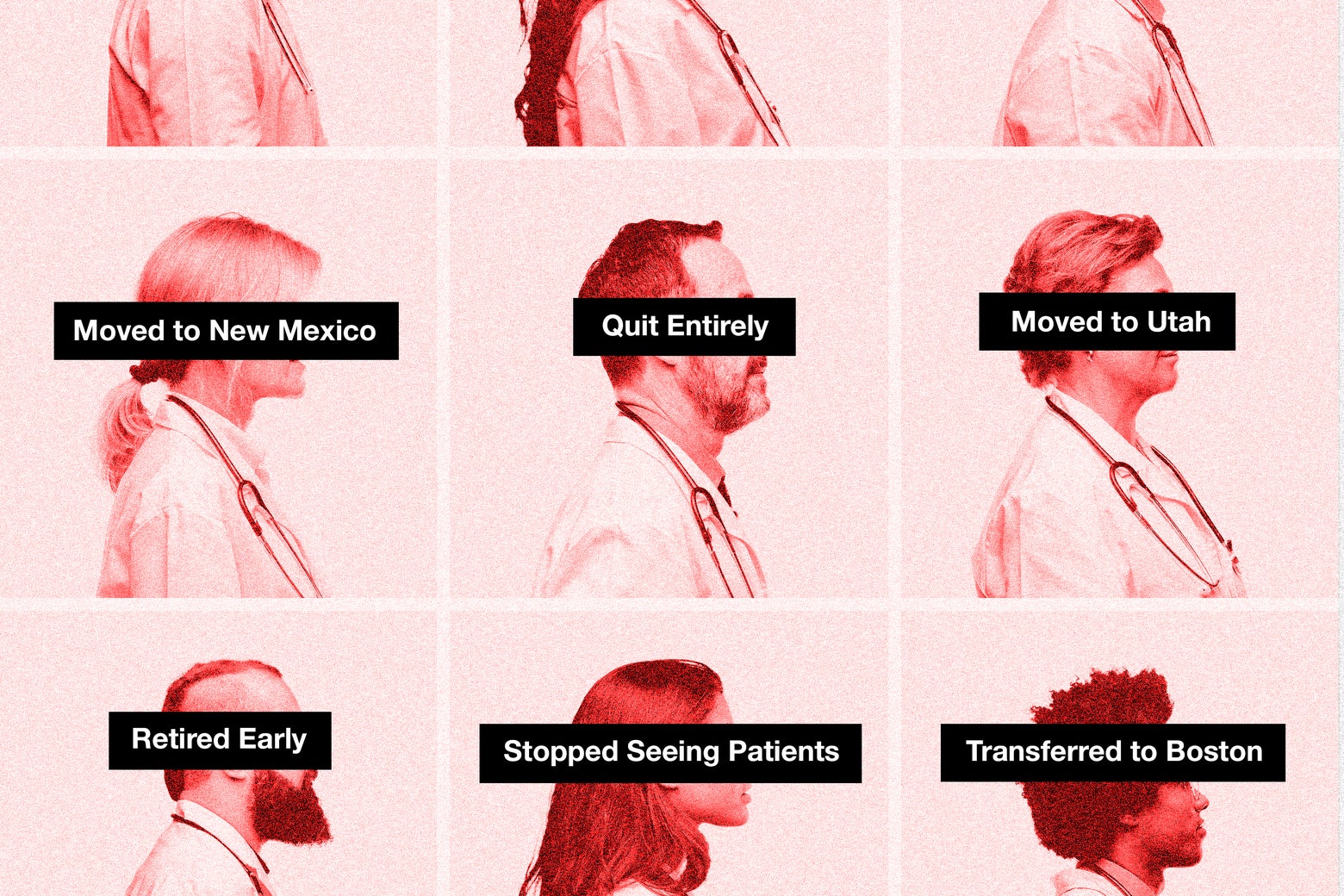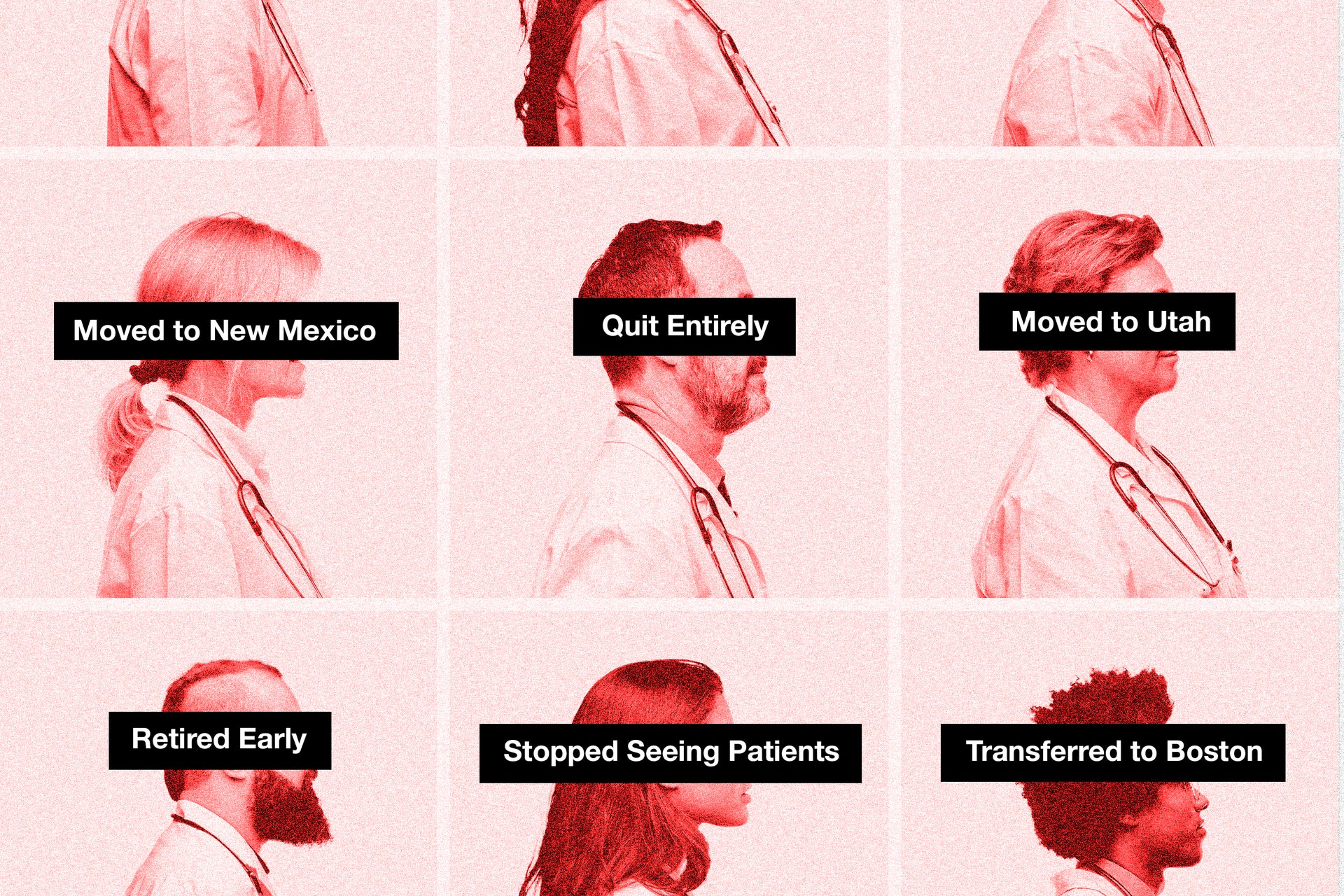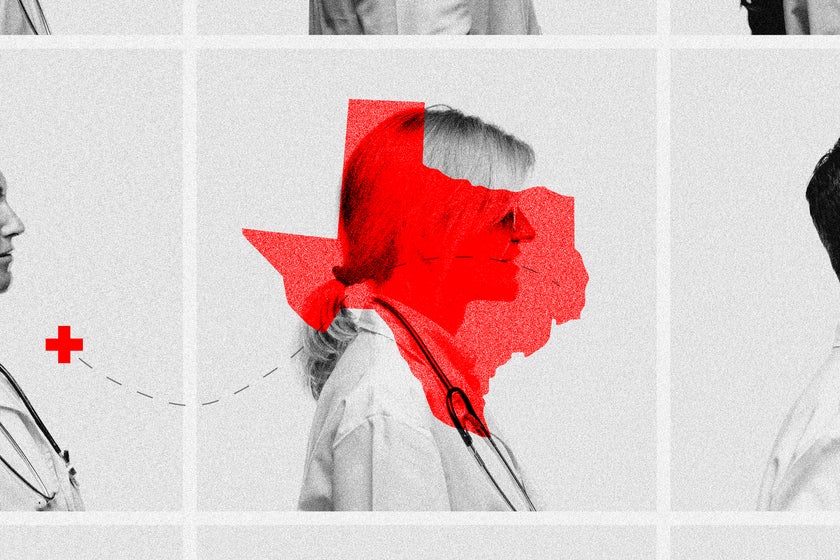
“You Know What? I’m Not Doing This Anymore”: The Disaster in Texas Everyone Should Have Seen Coming
Soon, it could get much worse.
There’s a quiet new crisis brewing in Texas following the abortion ban. It could get much worse.
BY SOPHIE NOVACKMARCH 21, 20235:45 AM

Illustration by Slate. Photo by Getty Plus.
For three days last fall, Leah Wilson entered her pregnant patient’s hospital room and checked the fetus for a heartbeat. She was waiting for it to stop. The woman’s water had broken at just 19 weeks of pregnancy, well before viability, causing an infection in her uterus. The fetus would not survive, but until it died, or the woman’s condition worsened, there was little the hospital would do, said Wilson, who was her nurse at the time.
Typically in this kind of situation, doctors would terminate the pregnancy to prevent a life-threatening infection or other serious complication. But this patient was in Texas, where abortion is no longer legal.
So they waited. The smell of the infection filled the room, Wilson said. She tried to help the patient stay clean. She watched her vitals and monitored her for sepsis—if the infection got bad enough, if it spread through her body, then the doctors would finally intervene, to save her life. Wilson struggled to explain to the woman slowly losing her pregnancy why they weren’t doing anything else to help. Finally, on the third day, she said, the heartbeat stopped.
By the time Wilson cared for this patient, she had been working as a labor and delivery nurse at the San Antonio hospital for about a year and a half. She decided to go into nursing after seven years at home raising her young kids, inspired by the complicated birth of her own son and the impact her nurses at the time had on both their recoveries. At the hospital, which sees a large number of high-risk pregnant patients from across the region, Wilson said she often volunteered to work on difficult cases involving fetal loss. Several of her friends had miscarried, and she wanted to be the nurse who supported other patients through it: “It’s always hard, but usually, you know, you go and you cry for your five minutes in the closet once things are over, and then you move on.”
By September 2021, though, caring for these patients became much scarier in Texas. That’s when Senate Bill 8 went into effect, banning nearly all abortions after about six weeks of pregnancy, and allowing virtually any person to sue anyone they suspected of “aiding and abetting” the procedure. The most restrictive abortion law in the country at the time, S.B. 8 included only an ambiguous exception for “medical emergencies,” resulting in hospitals delaying or denying care to people with pregnancy complications for fear of liability, and leaving providers worried they could be sued for tasks they had previously been doing without a second thought in their day-to-day work, including miscarriage management. By last summer, things had become even harder at Wilson’s hospital and across the state: Following the Supreme Court’s June 2022 decision in Dobbs v. Jackson Women’s Health Organization, Texas banned all abortions, with only narrow yet vague exceptions to save the life of the pregnant person and a potential penalty of life in prison for physicians. “It meant no longer providing the standard of care that we would have prior to Dobbs,” Wilson said. “It meant patients sitting there for days, actively losing nonviable pregnancies, and us waiting for something to go bad enough that we could help them.”
Wilson left her job soon after. “There were a couple of cases just within a few weeks of each other that I really, really, really struggled with,” she told me, including the patient who miscarried at 19 weeks pregnant. “And it was enough to say, You know what? I’m not doing this anymore.”
She’s not the only one. More than a year and a half after Texas implemented its six-week abortion ban, and months after Dobbs, medical providers say they are facing impossible situations that pit their ethical obligation to patients who are dealing with traumatic and dangerous pregnancy complications against the fear of lawsuits, loss of their medical licenses, and incarceration. The problem is encapsulated by a lawsuit filed this month in Texas, in which five women and two OB-GYNs sued the state over the abortion bans that they say have created so much confusion and fear among providers that it has affected women’s health and even threatened their lives. Unsure of how to comply with the new rules, hospitals have interpreted them differently, with some requiring approval from attorneys or ethics boards for physicians to provide abortion care in medical emergencies, and others leaving it up to individual doctors, with little guidance or support. This has meant that some physicians wait until patients are near death to intervene in medical emergencies, according to recent research, court filings, news reports, and interviews. “I’ll get consults from another doctor asking me what to do in a particular case—a mother bleeding, or a pregnancy where there’s an infection in the womb before the baby can survive outside the womb. I have doctors calling me, hesitating, not quite knowing what to do because the baby has a heartbeat, when clearly the mother’s life is at risk,” John Visintine, a maternal fetal medicine specialist in McAllen, Texas, told me. “These are things that I haven’t seen in, you know, 20 years of practicing OB, 14 years of practicing high-risk OB—I’ve never run into these situations where people are wondering what to do.”
The inability to provide what they say is the standard of care to pregnant patients is taking a toll, personally and professionally, according to interviews with more than a dozen doctors and nurses across Texas. And it’s causing many, like Wilson, to reconsider the future of their career in the state. Almost every provider I spoke with for this story has thought about leaving their practice or leaving Texas in the wake of S.B. 8 and Dobbs. Several have already moved or stopped seeing patients here, at least in large part because of the abortion bans. “If I was ever touch a patient again, it won’t be in the state of Texas,” said Charles Brown, chair of the Texas district of the American College of Obstetricians and Gynecologists (ACOG), who stopped seeing patients last year after decades working as a maternal fetal medicine specialist. Many asked that their hospital affiliation not be included in this story, in some cases because they feared consequences from their employer or the public for speaking out about these laws, even though they’re not breaking them. Some worry about what will happen to their own kids if they are targeted. Several cried through the interviews. Many of those I spoke with who haven’t left yet are still thinking about it regularly—people who have family and homes and lives in Texas and would not otherwise have considered moving.
Brown put the stakes bluntly: “Are people quitting? … The answer is yes,” he said. “I hope I’m 100 percent wrong about this, but I think it’s a much bigger trend that’s going to become obvious pretty quickly.”
After she finished her OB-GYN residency in Chicago in 2020, Yue Guan took a job in Fort Worth to be close to her family and support system in Texas. But the past year and a half has put in stark relief the differences in basic maternity care between Illinois, where abortions are legal up to about 24 weeks, and where she now practices.
This is especially true for patients at her hospital, many of whom are uninsured and don’t have access to preventive health care or early prenatal care. “For some of them, an issue with the pregnancy, like a fetal anomaly that wouldn’t be compatible with life, would not be discovered until much later,” she said. “So it’s so many more degrees more difficult for them.” At that point, if they wanted to terminate a nonviable pregnancy, their options for traveling out of state would be even more limited, and would require financial resources that many don’t have. The current abortion bans do not include any exception for severe fetal anomalies. Since the six-week ban went into effect, Guan said she’s had patients carry and deliver babies that they knew wouldn’t survive, because they didn’t have another option: “This definitely hits this population in a different, much more malicious way.”
In one case, she said a patient came to the hospital with a premature rupture of membranes, then found out the fetus had a severe anomaly that it likely would not survive. Generally, when a patient’s water breaks early and they are close to viability, they may be given antibiotics to try to prolong the pregnancy, Guan said. “This patient told us she wanted to decline the antibiotics so she could get sick enough so that we would offer her an abortion. And eventually she did get infected, and was delivered for that reason.”








